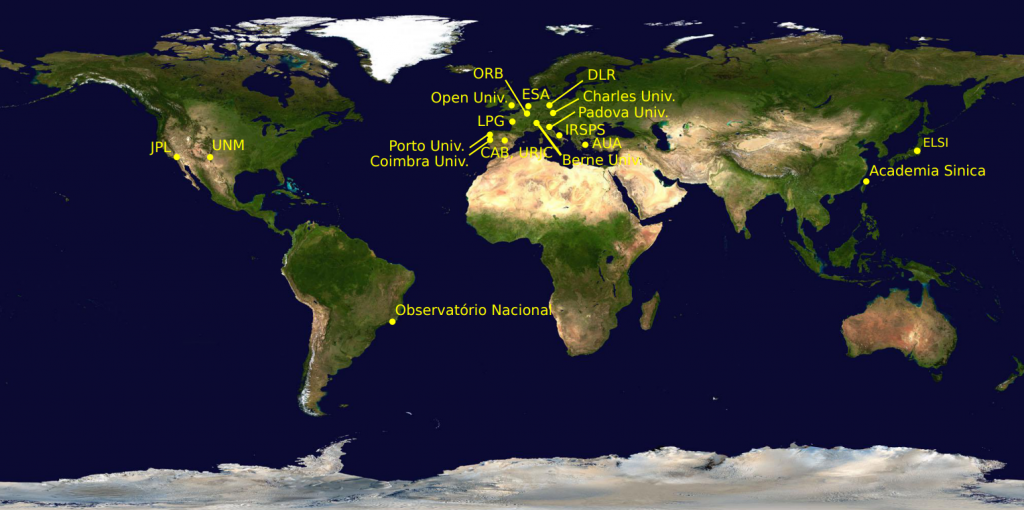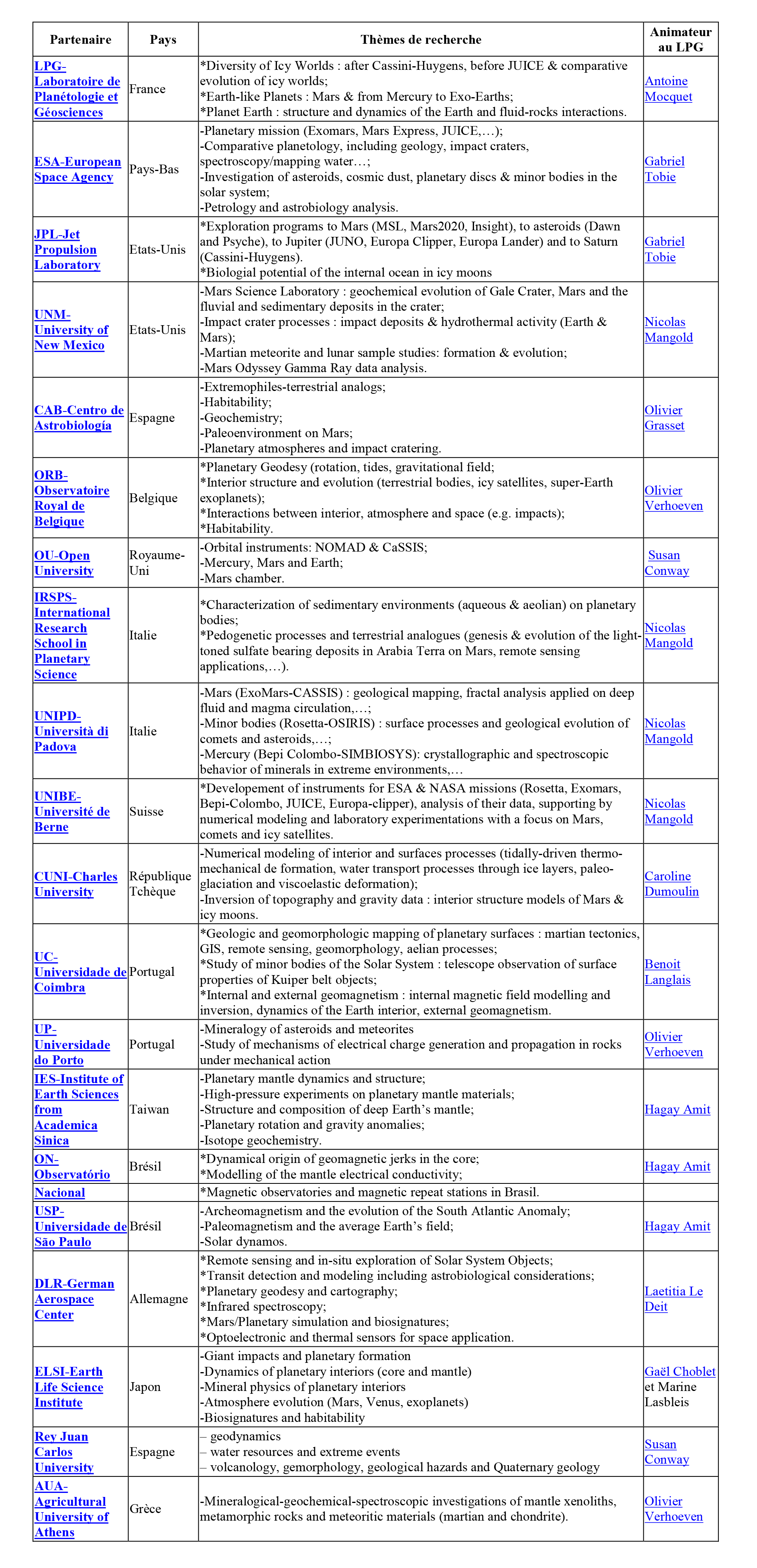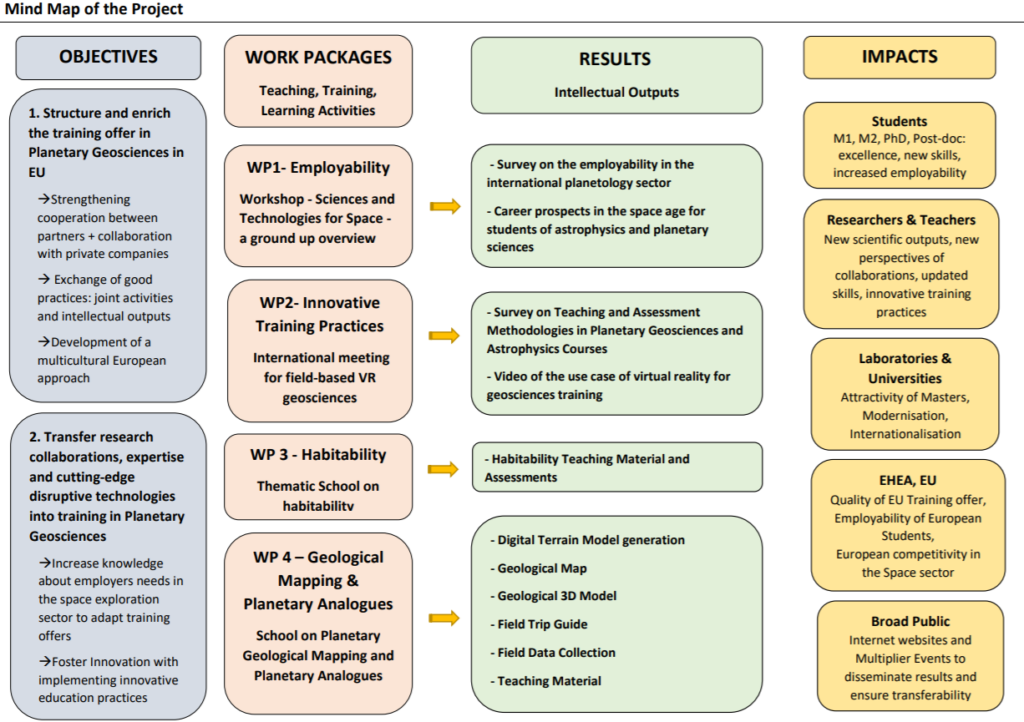GeoPlaNet Project

Nantes Université’s Laboratoire de Planétologie et Géosciences (LPG) has acquired an international reputation in planetary geoscience research through its participation in numerous space exploration missions in cooperation with international partners. The GeoPlaNet project, led by the LPG, was created in 2016 with the aim of structuring international research and training in planetary geosciences through two main axes.
Priority 1 – Enhancing training programmes for masters, doctoral students, post-docs and young researchers through two projects :
– 2017-2019 – GeoPlaNet project, funded bty the Région Pays de la Loire
– 2020-2023 – Erasmus+ Strategic partnership project, Action 2, co-funded by the European Commission
2017-2019 – GeoPlaNet project, funded by the Pays de la Loire Region as part of its “International Strategy” programme, with co-funding from Nantes Université and the CNRS.

One of the major achievements of this project has been the creation of the GeoPlaNet Consortium, which brings together around twenty institutes that are heavily involved with the LPG in space exploration missions and in developing the link between training and research in planetary geosciences.
The GeoPlaNet consortium

The consortium includes two partners from the Pays de la Loire Region : the Observatoire National des Sciences de l’Univers de Nantes-Atlantique (OSUNA) and Le Mans Geosciences, as well as international partners with whom the LPG has collaborated over the past 20 years. It includes 2 leaders in international space exploration: the Jet Propulsion Laboratory – Caltech (JPL, USA) and the European Space Agency (ESA, Europe), plus 7 European laboratories and 2 American laboratories already involved in NASA and ESA space exploration programmes.
In addition to these partners, the consortium includes 9 foreign laboratories, already leaders in earth science disciplines, whose objective is to extend their expertise to planetary geosciences. However, this list is not exhaustive. It is open to any LPG partner wishing to contribute to the construction of this international research and training network in planetary geosciences.

Over the three years of the project, the LPG has set up inward and outward mobility programmes between the laboratory and partners in the GeoPlaNet consortium : grants for Masters and PhD students, research visits by students and scientific residences for international researchers hosted at the LPG.
Three international schools were organised :

2. 2020-2023 – Erasmus Strategic Partnership Project, Action 2, co-funded by the European Commission

With the European academic partners of the GeoPlaNet consortium: the Universities of Coimbra and Porto in Portugal and Chieti-Pescara and Padova in Italy, the LPG has set up a series of training activities, intellectual outputs and dissemination events for the general public, organised into 4 themes: Employability, Innovative training practices (Virtual Reality), Habitability and Geological mapping and planetary analogues. Details of the project and its activities, as well as the results, can be found on the strategic partnership website: https://geoplanet-sp.eu/ :


Geology lessons in virtual reality: the teacher and students communicate and interact around the 3D model of Meteor Crater (Arizona) to discuss the geological processes behind the structures observed (software developed by VR2Planets)
Priority 2 – Building an international master’s degree in planetary geosciences

In 2019, the GeoPlaNExT project was selected by the NExT initiative, as part of its “International Masters” call, providing funding to develop an international Masters in planetary geosciences led by the LPG and the STU department of Nantes University, in collaboration with the partners of the GeoPlaNet Consortium. The aim of the Masters is to train experts capable of preparing, participating in operational activities, analysing and interpreting the results of space exploration missions. These missions use cutting-edge space technologies and benefit from the latest data processing methods. The presence in the project of space agencies and laboratories directly involved in the design and calibration of scientific instruments for these missions means that the GeoPlaNExT project is naturally in line with the development of the industry of the future supported by NExT.
2. In 2022, this International Masters project is awarded the prestigious ERASMUS Mundus label

The Erasmus Mundus Joint Masters in Planetary Geosciences is based on the complementary expertise of 3 partner universities (Coimbra, Chieti-Pescara, Nantes). It aims to welcome students from all over the world for a course of excellence within the three universities, with a first semester in Portugal, a second in Italy and the third in Nantes. Students will carry out their research internship in the fourth semester in one of the 20 member institutes of the GeoPlaNet consortium.
GeoPlaNet Erasmus Mundus Joint Master website : https://geoplanet-impg.eu/
Contacts :
Scientific coordinators
Olivier Verhoeven: olivier.verhoeven@univ-nantes.fr
Sabrina Carpy: sabrina.carpy@univ-nantes.fr
Project Manager
Marie-Pierre Jousse : marie-pierre.jousse@univ-nantes.fr

